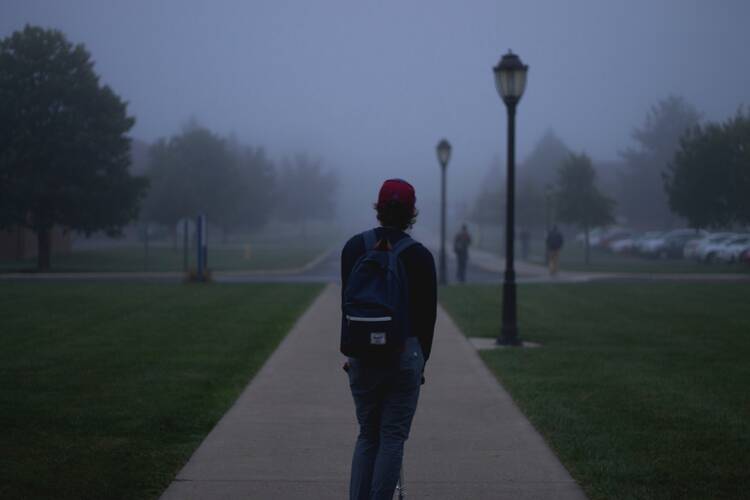It starts with glossy brochures and gauzy admissions videos: Feeling at home. Being part of the family.
What graduating senior wouldn’t want that sense of belonging at a college or university? The sentiment tugs at applicants’ hearts and parents’ wallets, promising an enriching, unforgettable four years. With the average cost of $72,050 for one year at Georgetown, for example, making “community” a key value proposition may be understandable. But where is that community centered, and where does it look? Back at itself or outward?
Catholic colleges may not have a monopoly on strong communities for young adults, but they should have an advantage. Any liberal arts school can offer small classes and late-night discourses in the dining hall. Catholic colleges certainly offer that, along with open discussions of faith inside and out of classrooms, and they ground often-amorphous definitions of values in the tradition of the universal church.
Catholic colleges may not have a monopoly on strong communities for young adults, but they should have an advantage.
But the rising number of unchurched high school graduates means that our baseline assumptions need to be updated. Roughly one in seven freshmen arriving at a Catholic campus self-identify as having no religious affiliation. Incoming students cannot be presumed to be familiar with the basic concepts of Catholicism, or even Christianity.
To be distinctive, the authentic community of a Catholic university must expand beyond the dorms, classrooms and chapels. A Catholic school must build bonds not just among classmates and alumni but between students and parishioners in Chestnut Hill, South Bend, Steubenville or whatever the host town.
Embracing the distinctiveness of being a Catholic university could include expanding town-gown joint volunteer opportunities and scheduling Mass times to complement, rather than compete with, nearby parishes. Most important, Catholic colleges should make a vocation to family life more recognizable to students, breaking down the oppressive age-based segregation of collegiate life by encouraging students to get to know young Catholic married couples and families at nearby parish events. (A more puckish observer might suggest campus ministry-sponsored speed dating). Each campus should do so its own way, creating an atmosphere of fellowship that extends beyond the physical campus.
When there was more widespread religious participation, this kind of intentionality would have been nice but unnecessary. But with our current political polarization, socioeconomic self-sorting and uncertainty about the social utility of religion, colleges and universities need to broaden their call to discipleship to stretch beyond the campus. The greenhouse must become a garden.
Amid the demographic challenges of a shrinking number of high school seniors and an amenities arms racethatundermines both financial sustainability and affordability, this effort will help Catholic colleges stand out. A campus that commits to a broad understanding of community and the education of the whole person might make the cost of attending a Catholic college a little easier for parents to swallow.
Seniors shed tears dreading a future without the supportive community of friends and peers at the institution they have grown to love.
Students that see themselves as part of a little platoon, rather than an elite squadron, would find their home on campus to be a fundamentally more hopeful place. Seniors would not shed tears dreading a future without the supportive community of friends and peers at the institution they have grown to love. Instead of an irreplicable four-year experiment, college would be seen as a community-building boot camp for their future vocations. A campus environment oriented toward membership in the universal church, rather than terminating in its own unique identity, would challenge those students to bring about that kind of authentic community after graduation.
In How Dante Can Save Your Life, the columnist Rod Dreher of The American Conservative distinguishes between an idol and an icon: An idol is something to be worshipped in and of itself, whereas an icon points toward a deeper reality. Too many Catholics (myself included) graduate with the community of their alma mater as an idol, with thoughts of brick buildings, beloved teachers and Frisbees on the quad. The challenge is to turn our collegiate love of patria into a philia, a sense of belonging with our brothers and sisters in the universal church.
A campus environment can be an idol wrapped up in school colors, late-night traditions and sporting events, or it can be an icon that points to the larger church—and ultimately, our hoped-for eternal campus. One is self-enclosed and interchangeable; the other goes out to the margins and is irreplaceable. For Catholic colleges to thrive, the choice is obvious.










Very well written!!
Some very sound food for thought here with a keen eye on the amenities war and other disconnects at Catholic colleges. I wonder if one more disconnect is the relationship between parent satisfaction for the money spent and the stature of the college as an icon in their lives. Often the parents are as idolatrous as the student in viewing the college. They bury their car bumpers with college stickers, and they empty their pockets in the campus store to buy merchandise for themselves. Don't know how many are too worried about the blending of the local parish community with that of the college.
My experience has been that the religiously formative nature of the college's campus ministry program can and does touch deeper into the heart of the student than any parish experience they have had. It would be a noble experiment to see some of the idol give way to the icon with supportive parish involvement.
How many so-called Catholic colleges even care about discipleship so secularized are they. How many Catholic colleges' only discipleship is political correctness and federal funds? How many so-called Catholic colleges are Catholic as the Church sees Catholic in Ex Corde Ecclesiae? The Land O' Lakes statement recently lauded in this magazine has done its damage.